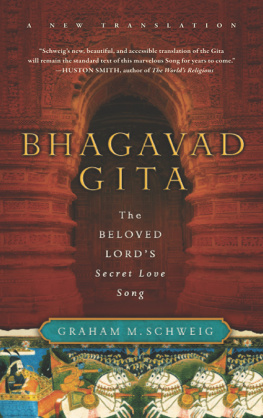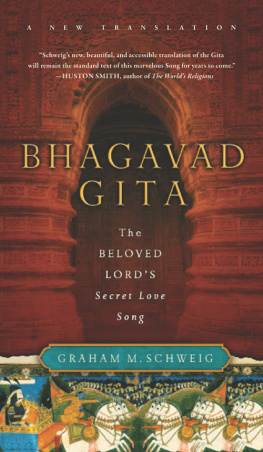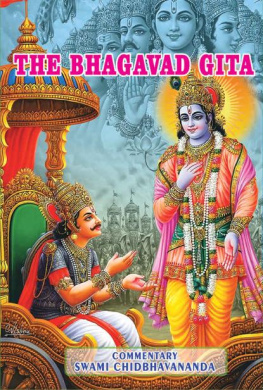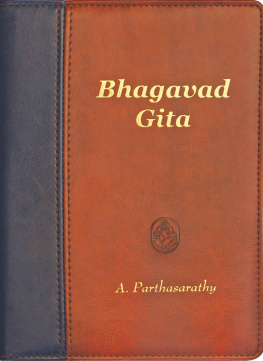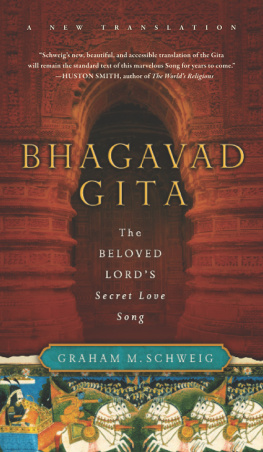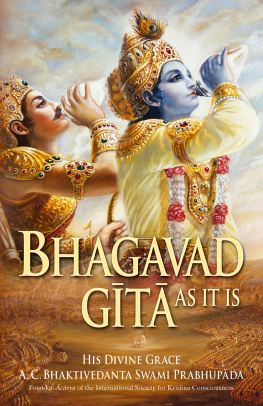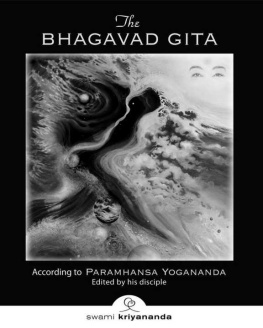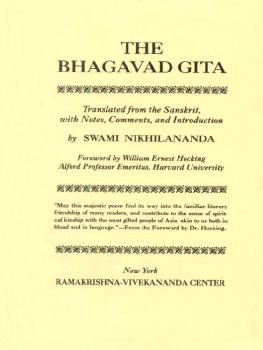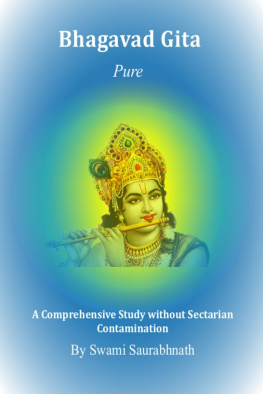Graham M. Schweig - Bhagavad GД«tДЃ
Here you can read online Graham M. Schweig - Bhagavad GД«tДЃ full text of the book (entire story) in english for free. Download pdf and epub, get meaning, cover and reviews about this ebook. year: 2017, publisher: HarperCollinsPublishers, genre: Religion. Description of the work, (preface) as well as reviews are available. Best literature library LitArk.com created for fans of good reading and offers a wide selection of genres:
Romance novel
Science fiction
Adventure
Detective
Science
History
Home and family
Prose
Art
Politics
Computer
Non-fiction
Religion
Business
Children
Humor
Choose a favorite category and find really read worthwhile books. Enjoy immersion in the world of imagination, feel the emotions of the characters or learn something new for yourself, make an fascinating discovery.
- Book:Bhagavad GД«tДЃ
- Author:
- Publisher:HarperCollinsPublishers
- Genre:
- Year:2017
- Rating:3 / 5
- Favourites:Add to favourites
- Your mark:
- 60
- 1
- 2
- 3
- 4
- 5
Bhagavad GД«tДЃ: summary, description and annotation
We offer to read an annotation, description, summary or preface (depends on what the author of the book "Bhagavad GД«tДЃ" wrote himself). If you haven't found the necessary information about the book — write in the comments, we will try to find it.
Bhagavad GД«tДЃ — read online for free the complete book (whole text) full work
Below is the text of the book, divided by pages. System saving the place of the last page read, allows you to conveniently read the book "Bhagavad GД«tДЃ" online for free, without having to search again every time where you left off. Put a bookmark, and you can go to the page where you finished reading at any time.
Font size:
Interval:
Bookmark:
Contents
The word Bhagavad means song, in this case one coming from Krishna or God. Clearly the text is a philosophical poem and not a song in the literal sense. At a deeper level, however, it is a song issuing forth from the heart of God. It is the secret call of the divinity for all souls to love him, to take the journey to him, to be blissfully united with him. Although India is the birthplace of a variety of religious traditions, including Buddhism, Jainism, and Sikhism, it is Hinduism that is the dominant religion in India today. Hinduism is composed of several primary and numerous less familiar traditions, all theologically distinctive, yet each acknowledging the revelational authority of a common ancient scriptural source.
Possibly the oldest sacred text in the world, dating as far back as 2500 to 1500 BCE, the collection of Sanskrit hymns known as the Vedas are foundational for the myriad traditions that come under the umbrella of Hinduism. These traditions make up the largest constituency of religious practitioners in South Asia. Among these, the traditions that focus upon the supreme divinity of Krishna or his cosmic manifestation of Vishnu are known as Vaishnava, and they constitute the dominant form of religion. The Bhagavad Gt comes to us from this Vaishnava tradition, which is present throughout India and, in the second half of the twentieth century, around the globe. This beloved book of India is often called the bible of Hinduism in the West. As the Bible is for Christians and the Quran for Muslims, so it could be said that the Bhagavad Gt is for Hindus, for it is the single most influential philosophical sacred text coming from South Asia.
Though it is, since the seventh century, the most widely read and commented on holy text in all of India, it comes from a tradition that reveres many sacred texts, unlike Western religious traditions, which focus on one sacred book of revelation. Moreover, though the Bhagavad Gt is usually read alone, it is a small section of a substantially larger text, perhaps the largest epic poem in the world, the Mahbhrata. The philosophical verses of the Gt stand gracefully as an autonomous text with a beginning, middle, and end, despite their original placement within the continuum of this greater epic poem. The Mahbhrata, containing approximately 100,000 verses, is thought by Western scholars to have appeared in its final form sometime between 500 BCE and 200 CE, though traditional dating of events in the text places them in the third millennium BCE. The eighteen chapters of the Gt appear as chapters 23 through 40 in the Book of Bhshma, the sixth of the Mahbhratas eighteen books. Historically, we first come to know of the divinity of Krishna in the Bhagavad Gt text.
Although his identity as the divine lover is not revealed in the Gt, Krishna is traditionally appreciated as the divinity who sends out a love call to all souls. His call is intended for those who relate to him in loving intimacy, not for those who regard him with reverential awe, worshipping primarily his attributes of cosmic power and majesty. As the supreme divinity, Krishna plays multiple roles, adopts a variety of personae, and displays numerous grand and cosmic manifestations, yet he is also delightfully playful and personal. The various roles that Krishna assumes in his more intimate acts, particularly as a youthful cowherd, are considered the most exquisite, revealing endearing and beautiful visions of the supreme. Most enchanting and charming, Krishna is loved and worshipped by Hindus in a variety of forms: as a sweet but mischievous child, as the closest friend, or even as the ultimate lover. In these intimate relationships with the divinity, Krishna, famous for his divine love call, sends forth his call by producing captivating music on his flute.
He is best known for alluring the lovely cowherd maidens of the paradisal village of Vraja out of their homes, one serene autumn evening. Upon hearing his irresistibly sweet flute music, the maidens abruptly abandon their families and household duties to join him in the moonlit forest. On this sanctified night, the maidens and Krishna enact the famous Rsa Ll, which I have broadly translated as the dance of divine love. In the Bhagavad Gt, Krishnas call to love, the expression of his divine longing, is a more hidden feature of the text, though it carries the Gts most powerful message: the heart of God passionately desires to connect with the hearts of humans. Here, Krishnas love call is directed to Arjuna, his dearest friend, who already knows Krishnas love but finds himself in a devastating worldly crisis that distracts him from the heart of God. In the dialogue that ensues between Krishna and Arjuna, Krishna gently and compassionately brings Arjunas heart back to his divine heart, even in the midst of the most trying of circumstanceswar.
As might be expected, the outer conflict that distracts Arjuna from his relationship with Krishna is accompanied by intense inner conflict. This personal crisis, however, serves to reunite Arjuna with the divinity, enabling him to return to the overwhelming challenges of the outer world with renewed strength and resolve. When turning to the first verse, the reader steps into a greater story that is already taking place. The opening words are spoken by a king, which we discover from his epithetical name, Dhritarshtra, meaning powerful ruler. From the background story that surrounds the Gt event we learn that this king, significantly, was born blind. The sons of the king are prepared to lead his army into battle against the sons of his deceased younger brother, Pndu, who inherited the throne from their renowned ancestor, the great King Bharata, due to the older sons blindness.
Unfortunately, when the noble and righteous Pndu passed away, his five sons (the Pndavas) were too young to assume the throne. Their envious uncle, in his blindness, thus took over the kingdom and ruled for many years, with devastating results. The Pndavas, led by Pndus grown son, the general and archer Arjunathe mightiest warrior of his timefervently desire to take charge of the kingdom to restore peace. Their uncle and his sons, however, led by the eldest son, Duryodhana, have refused to surrender the throne. Consequently, a battle is inevitable. This great classic of some seven hundred Sanskrit verses opens with the tension of imminent battle, as each army, lined up like pieces on a chessboard, looks over the other, setting the stage for the dialogue of the Bhagavad Gt.
The first half of the first chapter can be understood as the narration of Arjunas outer conflict (BG 1.11.27) and the second half as the expression of his inner conflict (BG 1.281.47). The full impact of the looming confrontation weighs on Arjuna as he prepares to lead his men against an enemy army composed of many of his teachers, friends, and even relatives. Anticipating that he will have to fight and slay those whom he loves and reveres, Arjuna is overcome by grief and hurled into debilitating despair: My limbs are sinking down and my mouth has become very dry. Also, my body trembles and the hairs of my limbs stand on end. My bow, Gndva, falls from my hand and even my skin is burning. (BG 1.291.30) While experiencing such agonizing symptoms of dread, Arjuna is unable to respond in accordance with his nature as a warrior to the outer conflict he faces. (BG 1.291.30) While experiencing such agonizing symptoms of dread, Arjuna is unable to respond in accordance with his nature as a warrior to the outer conflict he faces.
Next pageFont size:
Interval:
Bookmark:
Similar books «Bhagavad GД«tДЃ»
Look at similar books to Bhagavad GД«tДЃ. We have selected literature similar in name and meaning in the hope of providing readers with more options to find new, interesting, not yet read works.
Discussion, reviews of the book Bhagavad GД«tДЃ and just readers' own opinions. Leave your comments, write what you think about the work, its meaning or the main characters. Specify what exactly you liked and what you didn't like, and why you think so.

